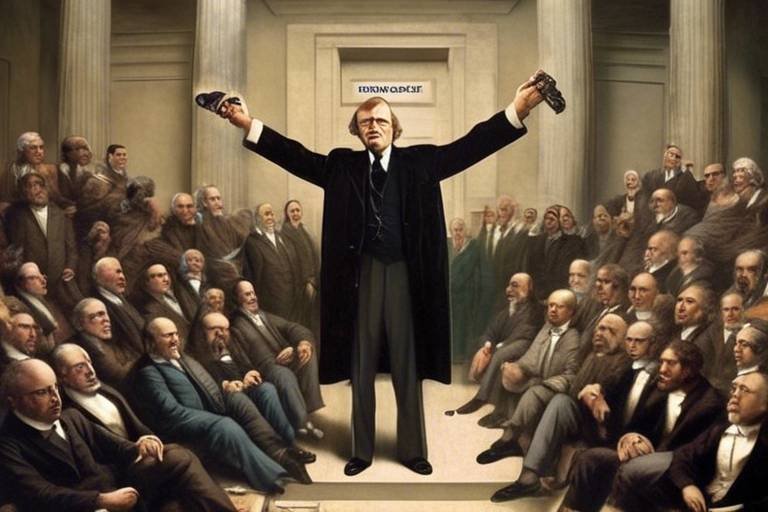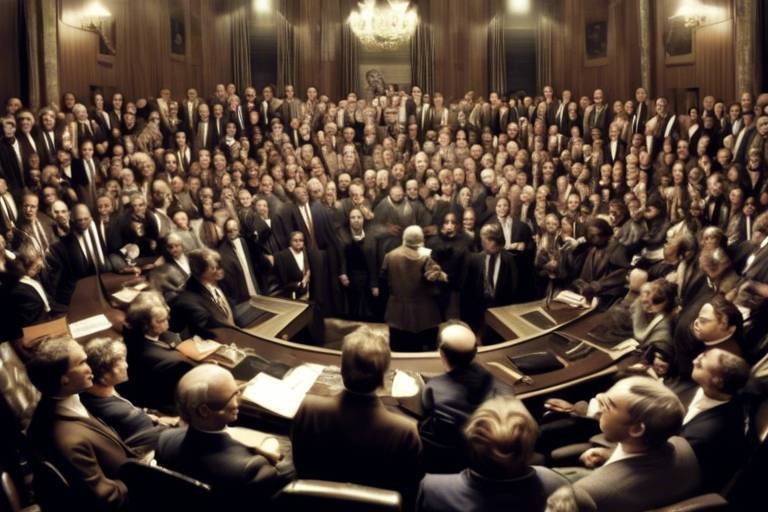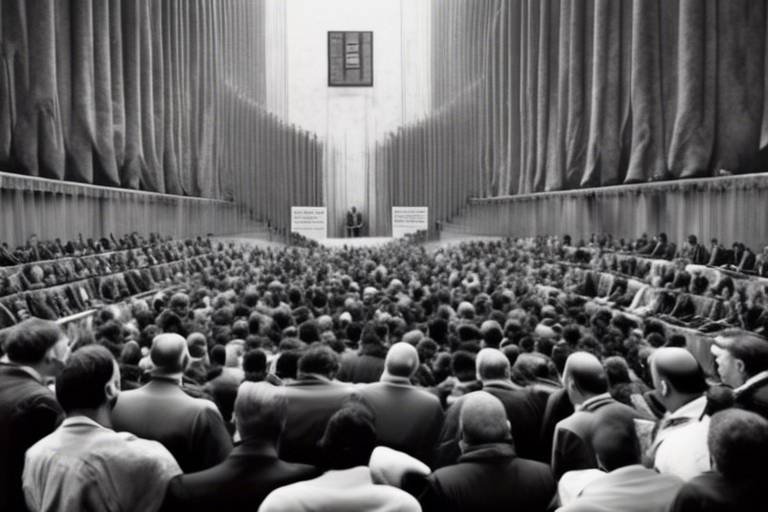The Philosophy and Politics of Reparations for Slavery
Reparations for slavery is a topic that stirs deep emotions and sparks intense debates. It’s not just about money; it’s about justice, acknowledgment, and healing. As we delve into this complex issue, we must navigate through a myriad of philosophical arguments and political considerations that have shaped the discourse over the years. The call for reparations is rooted in the historical injustices faced by African communities, and understanding this context is crucial to grasping its significance in modern society.
When we talk about reparations, we are essentially asking the question: How do we right the wrongs of the past? This inquiry is not merely academic; it resonates deeply with those who have been affected by the legacies of slavery. The implications stretch far beyond individual experiences and touch upon the collective consciousness of a society still grappling with its past. Reparations can take various forms, including financial compensation, educational opportunities, and community investments, all aimed at addressing the systemic inequalities that persist today.
As we explore this multifaceted issue, we will examine the historical context of slavery, the ethical arguments that support reparations, and the political movements advocating for change. We will also confront the opposition to reparations, looking closely at the challenges and societal divisions that arise in these discussions. By analyzing case studies from around the world, we can glean insights into what has worked and what has not, paving the way for informed conversations about reparations in the future.
Understanding the historical backdrop of slavery is essential to grasp the necessity for reparations. This section delves into the origins, practices, and impacts of slavery on African communities and societies.
This section outlines the moral rationale driving the reparations movement. It discusses the philosophical foundations that argue for justice, restitution, and the acknowledgment of historical wrongs as pivotal to societal healing.
An examination of how slavery has shaped economic disparities today. This subsection highlights the long-term economic effects on descendants of enslaved individuals and the broader implications for society.
This part focuses on the wealth gap between descendants of enslaved individuals and other racial groups, analyzing how historical injustices contribute to present-day economic inequalities.
Exploring the exploitation of enslaved labor and its lasting effects on labor markets, this section discusses how these practices have influenced contemporary employment and economic structures.
This section reviews the various political movements advocating for reparations, highlighting key organizations, figures, and legislative efforts that have shaped the reparations discourse over time.
Critics of reparations present a range of arguments against the movement. This section examines these opposing viewpoints and the rationale behind them, including concerns about feasibility and societal division.
Discussing the practical challenges of implementing a reparations program, this subsection addresses logistical, financial, and political hurdles that must be considered in any reparations proposal.
This part explores the potential for societal division that reparations discussions may provoke, analyzing public sentiment and the backlash against perceived preferential treatment or guilt-based reparative measures.
Examining historical and contemporary case studies provides insight into successful and unsuccessful reparations initiatives. This section highlights lessons learned and best practices from various contexts around the world.
This subsection reviews international cases of reparations, such as those in Germany and South Africa, to draw parallels and contrasts with the American context of slavery reparations.
Focusing on local efforts in various U.S. cities, this section showcases grassroots movements and their approaches to reparations, emphasizing community-driven solutions and their impact on local policy.
- What are reparations? Reparations refer to compensation given to the descendants of enslaved individuals to address the injustices and inequalities stemming from slavery.
- Why are reparations important? Reparations are crucial for acknowledging historical wrongs, promoting healing, and addressing systemic inequalities that persist today.
- What forms can reparations take? Reparations can include financial payments, educational opportunities, community investments, and public acknowledgment of historical injustices.
- How can reparations be implemented? Implementation requires careful planning, community involvement, and consideration of various logistical, financial, and political challenges.

The Historical Context of Slavery
Understanding the historical backdrop of slavery is essential to grasp the necessity for reparations. Slavery, as an institution, has deep roots that can be traced back thousands of years, but its most notorious manifestations occurred during the transatlantic slave trade, which spanned from the 16th to the 19th centuries. During this period, millions of Africans were forcibly taken from their homelands, enduring harrowing journeys across the Atlantic Ocean, often referred to as the Middle Passage. This brutal voyage was not only a physical ordeal but also a psychological trauma, stripping individuals of their identities and cultures.
The impact of slavery on African communities and societies was profound and devastating. Families were torn apart, communities were destabilized, and entire cultures were dismantled. The enslaved were subjected to inhumane conditions, forced labor, and severe punishments, all while being denied basic human rights. This systematic dehumanization laid the groundwork for centuries of racial discrimination and economic exploitation, the effects of which are still felt today.
To further illustrate the historical context, it's important to recognize the economic motivations behind slavery. European colonizers viewed enslaved Africans as mere commodities, essential for the profitability of plantations producing sugar, tobacco, and cotton. This exploitation not only enriched a select few but also established a wealth gap that persists in modern society. The table below outlines key aspects of the transatlantic slave trade:
| Aspect | Description |
|---|---|
| Duration | 16th to 19th centuries |
| Estimated Enslaved Africans | 12.5 million |
| Primary Destinations | North America, Caribbean, South America |
| Major Industries | Sugar, Tobacco, Cotton |
The repercussions of slavery extend far beyond the historical timeline. The legacy of slavery has created a complex web of social, economic, and political challenges that continue to affect African American communities. The denial of reparations is often seen as a continuation of the injustices faced by the descendants of enslaved individuals. As we delve deeper into the ethical arguments for reparations, it becomes clear that acknowledging this historical context is not merely an academic exercise; it is a crucial step toward understanding the **moral imperative** for justice and restitution in our society today.

The Ethical Arguments for Reparations
The conversation surrounding reparations is not just a political debate; it’s fundamentally an ethical dilemma that challenges our understanding of justice and accountability. At its core, the reparations movement argues that the injustices of slavery and systemic racism are not merely historical artifacts but living legacies that continue to shape the lives of millions today. This moral imperative is rooted in a few key principles that resonate deeply with the values of justice and equality.
First and foremost, reparations serve as a form of acknowledgment of historical wrongs. Ignoring the past does not erase it; rather, it perpetuates a cycle of injustice and denial. By formally recognizing the atrocities committed against enslaved individuals and their descendants, society takes a crucial step towards healing. This acknowledgment is not just about words; it is about validating the suffering endured over generations and giving voice to those who have been historically marginalized.
Moreover, the ethical arguments for reparations are grounded in the concept of justice. Justice is not merely about punishing wrongdoers but also about restoring balance and making amends for wrongs done. Just as individuals and communities seek reparative justice for crimes committed against them, so too should societies confront the injustices of their past. The reparations movement argues that financial compensation, educational opportunities, and community investments are essential to rectify historical wrongs and foster a more equitable future.
Another critical aspect of this ethical discourse is the notion of restitution. The descendants of enslaved individuals have inherited not only the trauma of their ancestors but also the systemic disadvantages that stem from centuries of oppression. This creates a moral obligation for society to provide restitution, as the benefits derived from slavery and racial discrimination have enriched many at the expense of others. The wealth generated through slave labor laid the foundation for economic prosperity in the United States, and it is only fair that this wealth be shared with those who suffered the consequences of such exploitation.
To illustrate the ethical rationale behind reparations, consider the following points:
- Restorative Justice: Reparations aim to restore dignity and provide a sense of justice to those affected by slavery.
- Collective Responsibility: Society as a whole bears responsibility for the injustices of the past, and reparations are a means to address this collective guilt.
- Future Generations: Investing in the descendants of enslaved individuals can help break the cycle of poverty and disenfranchisement, creating a more just society for all.
Furthermore, the ethical arguments for reparations are not limited to financial compensation alone. They encompass a broader vision of social equity, including access to education, healthcare, and housing. By addressing these systemic inequalities, reparations can pave the way for a more inclusive society where everyone has the opportunity to thrive. This holistic approach recognizes that the impacts of slavery are deeply intertwined with various aspects of life and that true reparative justice requires a multi-faceted response.
In conclusion, the ethical arguments for reparations are compelling and multifaceted. They challenge us to confront our past, acknowledge the suffering of others, and take meaningful action towards justice and equity. As we continue to engage in this vital conversation, it is essential to remember that reparations are not merely about compensation; they represent a commitment to building a more just and equitable society for future generations.
Q: What are reparations?
A: Reparations refer to compensatory measures taken to address the injustices and harms inflicted on a group of people, particularly in the context of slavery and systemic racism.
Q: Why are reparations important?
A: Reparations are important because they acknowledge historical wrongs, promote justice, and seek to rectify the ongoing impacts of slavery and discrimination.
Q: What forms can reparations take?
A: Reparations can take various forms, including financial compensation, educational opportunities, community investments, and policy changes aimed at reducing systemic inequalities.
Q: Who would be eligible for reparations?
A: Eligibility for reparations typically includes the descendants of enslaved individuals and those who have been directly affected by systemic racism and discrimination.

The economic impacts of slavery are profound and far-reaching, shaping not only the lives of those who were enslaved but also the very fabric of society today. To fully appreciate the **depth of these impacts**, one must consider how slavery created a foundation for economic disparities that persist in modern times. The wealth generated from enslaved labor fueled the growth of entire industries, particularly in the southern United States, where cotton became king. This wealth, however, was built on the backs of enslaved individuals who were denied any share of the profits. As a result, the descendants of these individuals continue to grapple with the long-term effects of this exploitation.
One of the most striking consequences of slavery is the **lasting economic inequality** that exists today. The systemic disenfranchisement of African Americans has created a significant wealth gap that is difficult to bridge. According to recent studies, the median wealth of Black families is less than one-tenth that of white families. This disparity can be traced back to historical injustices, such as the denial of property ownership and access to education, which were systematically enforced during and after the era of slavery.
Furthermore, the exploitation of enslaved labor has had a ripple effect on labor markets throughout history. The devaluation of Black labor has led to discriminatory practices that continue to affect employment opportunities for African Americans. For instance, even today, many Black workers face **barriers to entry** in various industries, often being paid less than their white counterparts for the same work. This persistent wage gap is not merely a product of individual choices but is deeply rooted in the economic structures that were established during slavery.
To illustrate the economic impacts of slavery, consider the following table that outlines key economic indicators related to wealth disparities:
| Demographic | Median Wealth | Home Ownership Rate | Unemployment Rate |
|---|---|---|---|
| White Families | $188,200 | 73% | 3.5% |
| Black Families | $24,100 | 44% | 6.5% |
This table starkly illustrates the **disparities** that have emerged as a result of historical injustices. The median wealth of Black families is a mere fraction of that of white families, highlighting the economic legacy of slavery. Additionally, the lower home ownership rate among Black families contributes to the wealth gap, as home ownership is a key avenue for building wealth in the United States.
In summary, the economic impacts of slavery are not just historical footnotes; they are a **living reality** that continues to affect millions. The legacy of exploitation and inequality has created a cycle that is challenging to break. As we move forward in discussions about reparations and social justice, it is crucial to acknowledge these economic disparities and work towards solutions that can foster equity and opportunity for all.
- What are reparations? Reparations refer to compensation given to individuals or communities for past injustices, particularly those related to slavery and systemic racism.
- Why are economic impacts of slavery important? Understanding the economic impacts helps to highlight the ongoing disparities that affect descendants of enslaved individuals and emphasizes the need for reparative measures.
- How can reparations be implemented? Implementation can vary widely, including direct payments, educational opportunities, and community investments, but it requires careful planning and public support.

Wealth Disparities
The issue of between descendants of enslaved individuals and other racial groups is not just a number on a spreadsheet; it’s a profound reflection of historical injustices that continue to echo through generations. To truly understand the gravity of this situation, we must first acknowledge that the wealth gap is not merely a result of personal choices or economic fluctuations. Instead, it is deeply rooted in the systemic inequalities established during the era of slavery and perpetuated through discriminatory policies long after emancipation.
For instance, consider the fact that while African Americans have made significant strides in various sectors, the racial wealth gap remains staggering. According to recent studies, the median wealth of white families is approximately ten times greater than that of Black families. This disparity can be attributed to a myriad of factors, including historical exclusion from wealth-building opportunities such as home ownership, education, and employment. For many African Americans, the legacy of slavery and subsequent discriminatory practices has meant being systematically denied access to the same economic resources that have allowed other racial groups to flourish.
To illustrate this point further, let’s take a look at a simplified table comparing median household wealth across different racial groups:
| Racial Group | Median Household Wealth |
|---|---|
| White Families | $188,200 |
| Black Families | $24,100 |
| Hispanic Families | $36,100 |
This stark contrast highlights the long-term effects of slavery and the subsequent policies that have marginalized African Americans. Furthermore, the ramifications of these wealth disparities extend beyond individual families; they affect entire communities. Areas with a higher concentration of wealth tend to have better schools, infrastructure, and healthcare facilities, which are all critical components for a thriving society. Conversely, communities burdened by poverty often face a cycle of disadvantage that is hard to break.
Moreover, the wealth gap is not only an economic issue; it’s a social one. It fosters feelings of resentment and division, leading to a society where opportunities are not equitably distributed. When discussing reparations, it’s crucial to recognize that addressing wealth disparities is not just about financial compensation but also about restorative justice. It’s about acknowledging the historical wrongs and taking actionable steps toward creating a more equitable society. Without addressing these disparities, any conversation about reparations risks being superficial, failing to tackle the root causes of inequality.
In conclusion, the wealth disparities that exist today are a direct reflection of the injustices that have been perpetuated through history. To move forward, society must engage in a meaningful dialogue about reparations that includes not only financial restitution but also comprehensive strategies aimed at closing the wealth gap. Only then can we hope to build a future where all individuals have equal opportunities to thrive.
- What are reparations? Reparations refer to compensation given to individuals or communities for historical injustices, particularly in the context of slavery and systemic racism.
- Why are wealth disparities significant? Wealth disparities highlight the ongoing effects of historical injustices and systemic inequalities that continue to affect marginalized communities today.
- How can reparations address wealth disparities? Reparations can provide financial compensation and support initiatives aimed at closing the wealth gap, thereby promoting economic equity.

Labor and Exploitation
The legacy of slavery is not just a chapter in history books; it is a haunting echo that reverberates through the corridors of modern labor markets. The exploitation of enslaved individuals was not merely a practice of the past; it has left a profound impact on how labor is perceived and valued today. To fully understand this, we must first recognize that the system of slavery was built on the backs of countless men, women, and children, who were denied their basic rights and freedoms. This exploitation created a foundation that has shaped economic structures and labor relations for generations.
When we think about labor today, it’s essential to remember that the very fabric of American industry was woven with the threads of enslaved labor. From the cotton fields of the South to the construction sites of burgeoning cities, the unpaid labor of enslaved individuals not only enriched the slave owners but also fueled the nation’s economic growth. This exploitation has long-lasting effects, contributing to a cycle of poverty and disenfranchisement that many descendants of enslaved people still face. The question arises: how do we reconcile this history with the present labor landscape?
To illustrate the impact of this historical exploitation, consider the following table that highlights key areas where the legacy of slavery continues to influence labor markets:
| Area | Impact of Slavery |
|---|---|
| Wage Gaps | Significant wage disparities persist between Black workers and their white counterparts, rooted in the historical denial of fair compensation. |
| Job Opportunities | Systemic barriers continue to limit access to quality job opportunities for many descendants of enslaved individuals. |
| Workplace Discrimination | Racial discrimination in hiring and promotions can be traced back to the devaluation of Black labor during slavery. |
Moreover, the exploitation of enslaved labor has fostered a culture where the labor of marginalized communities is often undervalued. This is evident in industries that rely heavily on low-wage labor, where workers often face harsh conditions and minimal rights. The echoes of slavery can be heard in the struggles of today’s workers who fight for fair wages, safe working conditions, and respect. The fight for labor rights is, in many ways, a continuation of the struggle against the exploitation that began centuries ago.
In reflecting on the past, it’s crucial to ask ourselves: what responsibilities do we hold today? Acknowledging the exploitation of labor is not just about recognizing historical injustices; it’s about understanding how these injustices manifest in our current economic systems. By addressing these issues, we can begin to create a more equitable labor market that honors the sacrifices of those who came before us.
- What is the main argument for reparations related to labor exploitation? The argument centers on acknowledging the historical injustices of slavery and the ongoing economic disparities that result from it.
- How does labor exploitation today relate to the legacy of slavery? Many aspects of modern labor exploitation can be traced back to the systemic inequalities established during slavery, including wage gaps and discrimination.
- What can be done to address the impacts of labor exploitation? Implementing policies that promote equity, fair wages, and anti-discrimination measures can help rectify these historical wrongs.

Political Movements and Advocacy
The journey toward reparations for slavery has been significantly shaped by various political movements and advocacy groups that have emerged over the decades. These movements are not just a response to historical injustices; they are a clarion call for recognition, justice, and healing. From grassroots organizations to national coalitions, the push for reparations has gained momentum, fueled by a growing awareness of the profound impacts of slavery and its lingering effects on African American communities.
One of the most notable organizations in this fight is the National Coalition of Blacks for Reparations in America (N'COBRA). Founded in the 1990s, N'COBRA has been instrumental in mobilizing support and advocating for legislative measures aimed at addressing the injustices of slavery. Their efforts have included organizing conferences, educational campaigns, and lobbying for reparations bills at various levels of government. Their work highlights the importance of a collective voice in the pursuit of reparative justice.
In addition to N'COBRA, numerous other groups, such as the Movement for Black Lives and the Black Lives Matter movement, have incorporated the issue of reparations into their broader advocacy for racial justice. These organizations use modern platforms, including social media, to raise awareness and engage younger generations in the conversation about reparations. Their strategies often involve a mix of direct action, community organizing, and public education, aiming to galvanize support for reparations among a diverse audience.
Furthermore, the political landscape has seen a shift as more elected officials begin to openly support reparations. For instance, in 2020, the U.S. House of Representatives held a hearing on reparations for the first time in over a decade. This event marked a significant moment in the reparations movement, as it demonstrated that the issue is gaining traction in mainstream political discourse. Advocates argue that such hearings are crucial for legitimizing the conversation and pushing for concrete legislative action.
However, the road to reparations is fraught with challenges. Many advocates face opposition from various quarters, including political figures who argue against the feasibility of reparations. Critics often raise concerns about the potential for societal division and the complexities involved in determining eligibility and the form reparations should take. Nevertheless, proponents argue that the moral imperative for reparations far outweighs these challenges, emphasizing the need for a national reckoning with the past.
In summary, the political movements advocating for reparations play a vital role in shaping the narrative around this critical issue. Through a combination of grassroots activism, legislative advocacy, and public engagement, these movements strive to bring the conversation about reparations into the forefront of American politics. As the dialogue continues to evolve, the commitment of these organizations remains a beacon of hope for those seeking justice and acknowledgment of the injustices of slavery.
- What are reparations for slavery? Reparations for slavery refer to compensatory measures taken to address the injustices and economic disadvantages faced by the descendants of enslaved individuals.
- Why are reparations important? They are seen as a means of acknowledging historical wrongs and providing justice to those who have been adversely affected by the legacy of slavery.
- What challenges do advocates face in pushing for reparations? Advocates encounter logistical, financial, and political hurdles, as well as societal division and backlash against the movement.
- Are there examples of successful reparations initiatives? Yes, there are historical and contemporary examples, such as reparations in Germany for Holocaust survivors and initiatives in South Africa post-apartheid.

Opposition to Reparations
The topic of reparations for slavery has sparked intense debates, with passionate arguments on both sides. Critics of reparations often raise a variety of concerns that reflect deeper societal anxieties and historical contexts. One of the most prominent arguments against reparations is the issue of feasibility. Detractors argue that implementing a reparations program poses significant logistical challenges. For instance, determining who qualifies for reparations can be a complicated and contentious process. Would it be limited to direct descendants of enslaved individuals, or should it extend to broader communities affected by systemic racism?
Additionally, the financial implications of such a program are daunting. Critics often point to the potential costs involved in compensating millions of individuals, which could strain public resources. The question arises: who would fund these reparations? Would it come from taxpayers, and how would that impact public services? These logistical and financial hurdles create a perception that reparations might be more of a dream than a feasible reality.
Another significant point of opposition revolves around the potential for societal division. Many argue that reparations could exacerbate racial tensions rather than heal them. The fear is that discussions around reparations may lead to a backlash from those who perceive it as preferential treatment or a form of guilt-based reparative measure. This sentiment can manifest in various ways, from public protests to political movements that push back against perceived injustices in the reparations debate.
Furthermore, critics often highlight the argument that the current generation should not be held accountable for the actions of their ancestors. They contend that focusing on historical injustices might detract from addressing contemporary issues of inequality and social justice. Instead of reparations, some suggest that resources should be allocated to universal programs that benefit all disadvantaged communities, regardless of racial background.
To illustrate these points, consider the following table that summarizes common arguments against reparations:
| Argument | Description |
|---|---|
| Feasibility | Challenges in determining eligibility and funding sources. |
| Societal Division | Concerns that reparations may exacerbate racial tensions. |
| Accountability | Argument against holding current generations responsible for historical injustices. |
| Alternative Solutions | Proposal to focus on universal programs benefiting all disadvantaged groups. |
In summary, while the call for reparations is rooted in a desire for justice and acknowledgment of historical wrongs, the opposition raises valid concerns that cannot be ignored. Engaging in constructive dialogue that addresses these issues is crucial for moving forward. Only through understanding and addressing the complexities of this debate can society hope to find a path toward reconciliation and healing.
- What are reparations? Reparations refer to compensatory measures taken to address the injustices and harms caused by slavery and systemic racism.
- Who would qualify for reparations? This is a contentious issue, with debates focusing on whether reparations should be limited to direct descendants of enslaved individuals or extended to broader communities.
- What are the main arguments against reparations? Critics often cite feasibility, societal division, accountability, and the potential for alternative solutions as reasons against reparations.
- How could reparations be implemented? Implementation would require careful consideration of funding, eligibility, and the potential impact on society.

Feasibility and Implementation Challenges
When we dive into the conversation about reparations, we quickly realize that the idea sounds noble and just. However, the road to implementing reparations is paved with significant feasibility and logistical challenges that cannot be overlooked. One of the first hurdles is the question of who qualifies for reparations. Should it be direct descendants of enslaved individuals, or should it extend to broader communities impacted by systemic racism? This ambiguity can lead to heated debates, complicating the process from the get-go.
Another major challenge lies in determining the financial burden of reparations. How do we quantify the historical injustices? Some estimates suggest that reparations could cost the U.S. government trillions of dollars. This figure raises eyebrows, especially among lawmakers concerned about budget allocations and economic stability. To put this into perspective, consider the following table that outlines potential funding sources for reparations:
| Funding Source | Estimated Contribution |
|---|---|
| Tax Revenue Increases | $500 billion |
| Corporate Contributions | $300 billion |
| Philanthropic Donations | $200 billion |
| Government Budget Reallocation | $1 trillion |
In addition to financial considerations, there are also political hurdles that must be navigated. The idea of reparations can be polarizing, leading to backlash from various political factions. Critics often argue that reparations could exacerbate societal divisions, fueling resentment among those who feel they are being unfairly taxed to compensate others. This sentiment can create a political environment where advocates for reparations find it difficult to gain traction, making it essential for proponents to engage in effective communication and education to mitigate misunderstandings.
Moreover, the implementation of a reparations program would require a robust administrative framework. Who would oversee the distribution of funds? What criteria would be used to determine eligibility? These questions necessitate careful planning and transparency to ensure that the program is both fair and effective. Many advocates argue that a thorough community engagement process is essential to create a reparations initiative that resonates with those it aims to help. This might involve town hall meetings, surveys, and collaboration with community leaders to gather input and foster a sense of ownership among affected populations.
In summary, while the quest for reparations is rooted in a desire for justice and healing, the feasibility and implementation challenges are significant. Addressing these challenges requires a multifaceted approach that includes financial planning, political strategy, and community involvement. Only through a comprehensive understanding of these obstacles can we hope to create a reparations framework that is both effective and equitable.
Frequently Asked Questions
- What are reparations? Reparations refer to compensation given to individuals or communities for injustices suffered, particularly in the context of slavery and systemic racism.
- Who would receive reparations? Eligibility criteria for reparations are still being debated, but it generally focuses on descendants of enslaved individuals and communities affected by systemic discrimination.
- How would reparations be funded? Potential funding sources include government budget reallocations, tax revenue increases, corporate contributions, and philanthropic donations.
- What challenges do reparations face? Challenges include determining eligibility, financial implications, political opposition, and logistical issues in implementation.

Societal Division and Backlash
The topic of reparations for slavery is not just a matter of financial compensation; it’s a deeply emotional and polarizing issue that has the potential to create significant societal division. Many people view reparations as a necessary step toward justice and healing, while others see it as a divisive measure that could exacerbate racial tensions. This dichotomy raises important questions: Can we truly achieve reconciliation without addressing historical injustices? Or will the push for reparations only deepen the chasm between different racial and socio-economic groups?
Critics of reparations often argue that such measures could lead to feelings of resentment among those who perceive themselves as unfairly penalized for the actions of their ancestors. For instance, some individuals might feel that they are being held accountable for historical injustices they did not personally commit, leading to a sense of injustice in itself. This sentiment is often compounded by the fear that reparations could foster a society where racial identities are emphasized over shared humanity, thus creating further divisions rather than healing them.
Moreover, the backlash against reparations can manifest in various forms, from political opposition to social media campaigns that label reparations proponents as radical or divisive. This backlash is fueled by the perception that reparations may benefit only a select group, potentially alienating those who believe they have been equally marginalized. The argument often posited is that resources should be allocated based on need rather than race, emphasizing a meritocratic approach to societal issues.
To illustrate the complexities surrounding societal division and backlash, consider the following points:
- Public Sentiment: Polls have shown a mixed response to the idea of reparations, with many Americans expressing skepticism or outright opposition. This ambivalence can lead to a lack of consensus on how best to address historical injustices.
- Media Representation: The portrayal of reparations in the media can heavily influence public opinion. Sensationalized narratives often overshadow the nuanced discussions that are necessary for understanding the rationale behind reparations.
- Political Rhetoric: Politicians may exploit the divisive nature of reparations for their own agendas, framing the issue in a way that mobilizes their base but alienates others, further complicating the dialogue.
In conclusion, while the call for reparations is rooted in a desire for justice and acknowledgment of past wrongs, it also brings forth significant challenges in terms of societal cohesion. The potential for backlash and division cannot be ignored, necessitating a careful and inclusive approach to discussions about reparations. Engaging in open dialogue that considers multiple perspectives may help bridge the gap and foster a more unified understanding of this complex issue.
What are reparations?
Reparations refer to compensation or restitution provided to individuals or communities for historical injustices, particularly those related to slavery and systemic discrimination.
Why are reparations important?
Reparations are seen as a means to acknowledge and address the lasting impacts of slavery and discrimination, promoting healing and justice within affected communities.
What are some common arguments against reparations?
Critics often argue that reparations could lead to societal division, are impractical to implement, and may unfairly penalize individuals who were not directly involved in past injustices.
Are there examples of successful reparations initiatives?
Yes, there have been successful reparations initiatives in various countries, including Germany's compensation to Holocaust survivors and South Africa's Truth and Reconciliation Commission.

Case Studies of Reparations
The topic of reparations is not just a theoretical discussion; it has been put into practice in various forms across the globe. By examining different case studies, we can gain valuable insights into what works, what doesn't, and the myriad ways societies have attempted to address historical injustices. One of the most prominent examples can be found in post-World War II Germany, where the government made reparations payments to Holocaust survivors. These payments were not merely financial; they symbolized a societal acknowledgment of guilt and a commitment to never forget the atrocities committed. This case illustrates that reparations can serve as a powerful tool for healing, allowing victims and their descendants to reclaim their dignity.
Similarly, in South Africa, the Truth and Reconciliation Commission (TRC) was established in the aftermath of apartheid to address the injustices faced by black South Africans. The TRC offered a platform for victims to share their stories, while also recommending reparations for those who suffered under the oppressive regime. This initiative highlighted the importance of acknowledgment and healing in the reparations process, showing that financial compensation alone is often insufficient without a broader societal commitment to justice and reconciliation.
In the United States, local initiatives have emerged in cities like Evanston, Illinois, and Asheville, North Carolina, where local governments have taken steps to address the legacy of slavery. Evanston, for example, has implemented a reparations program funded by a tax on cannabis sales, aimed at providing housing assistance to Black residents. This innovative approach demonstrates how reparations can be tailored to meet specific community needs while also engaging in the broader conversation about racial justice. Similarly, Asheville's city council passed a resolution acknowledging the harm caused by discriminatory housing policies and committed to investing in Black neighborhoods. These local efforts show that while the national conversation about reparations remains contentious, grassroots movements can pave the way for meaningful change.
To further illustrate the diversity of reparations initiatives, let’s take a look at some key elements that define successful reparations programs:
| Key Elements | Description |
|---|---|
| Acknowledgment | Public recognition of the historical injustices faced by affected communities. |
| Compensation | Financial or material restitution to victims or their descendants. |
| Community Engagement | Involvement of affected communities in the design and implementation of reparations programs. |
| Education | Efforts to educate the broader public about the historical context and ongoing impacts of injustices. |
These elements highlight the multifaceted nature of reparations and the necessity of a comprehensive approach that goes beyond mere financial compensation. The lessons learned from these case studies can inform future discussions about how to effectively address the legacy of slavery and systemic racism in the United States.
Q: What are reparations?
A: Reparations refer to compensation or restitution provided to individuals or communities that have suffered injustices, particularly due to historical wrongs such as slavery or discrimination.
Q: Why are reparations important?
A: Reparations are important because they acknowledge past injustices, provide a means of restitution, and can help to heal societal wounds by fostering understanding and reconciliation.
Q: What forms can reparations take?
A: Reparations can take various forms, including financial compensation, community investments, educational programs, and public acknowledgment of historical wrongs.
Q: Are there any successful examples of reparations?
A: Yes, successful examples include Germany's reparations to Holocaust survivors and South Africa's Truth and Reconciliation Commission, which aimed to address injustices faced during apartheid.
Q: What challenges do reparations face?
A: Challenges include political resistance, concerns about feasibility, and fears of societal division, which can complicate the implementation of reparations programs.

International Examples
When discussing reparations, it's enlightening to look beyond the American context and explore how other countries have approached this sensitive issue. One prominent example is Germany's reparations to Holocaust survivors. Following World War II, the German government recognized its role in the atrocities committed against the Jewish people and initiated a series of reparations programs. These included financial compensation, social services, and the establishment of memorials to honor victims. This acknowledgment of historical wrongs has been pivotal in Germany's journey toward reconciliation and healing.
Another significant case is that of South Africa, which, after the end of apartheid, faced the monumental task of addressing the injustices inflicted upon its Black population. The Truth and Reconciliation Commission (TRC), established in the 1990s, played a crucial role in uncovering the truth about past abuses and offering reparations to victims. The TRC recommended various forms of reparations, including financial compensation, community rehabilitation projects, and the establishment of memorials. This approach aimed to foster national unity while acknowledging the deep scars left by decades of racial oppression.
In both cases, the reparations initiatives were not without their challenges. Critics often pointed out the difficulty of adequately compensating victims, as well as the potential for societal division. However, these examples illustrate the importance of addressing historical injustices as a means of promoting healing and reconciliation. They also highlight the need for a comprehensive strategy that includes not just financial compensation, but also public acknowledgment and education about past wrongs.
Moreover, we can learn from the international reparations movement, which has gained momentum in various forms worldwide. For instance, countries like Canada and New Zealand have taken steps toward acknowledging historical injustices against Indigenous populations through reparations and land restitution. These initiatives often include a combination of monetary compensation, land return, and formal apologies, aiming to restore dignity and rectify historical wrongs.
As we examine these international examples, it becomes clear that while the paths to reparations can differ greatly, the underlying principles remain the same: acknowledgment of past wrongs, a commitment to justice, and a desire for healing. The lessons learned from these countries can provide valuable insights for the ongoing discussions surrounding reparations for slavery in the United States. By understanding how other nations have navigated these complex waters, we can better inform our own approach and strive for a more equitable future.
- What are reparations for slavery? Reparations for slavery refer to compensation or restitution provided to descendants of enslaved individuals as a means of addressing the historical injustices and ongoing inequalities resulting from slavery.
- Why are international examples of reparations important? International examples help to illustrate different approaches to reparations, providing valuable lessons on what has worked and what challenges may arise in the process.
- How can reparations be implemented effectively? Effective reparations require a comprehensive strategy that includes financial compensation, public acknowledgment, education about historical injustices, and community-driven initiatives.

Local Initiatives in the U.S.
Across the United States, local initiatives for reparations have gained momentum, igniting discussions that challenge the status quo and seek to address the historical injustices of slavery. These grassroots movements are not just about financial compensation; they encompass a broader vision of restorative justice that aims to heal communities and acknowledge the deep scars left by systemic racism. One of the most notable examples can be found in cities like Evanston, Illinois, where local lawmakers have taken tangible steps towards reparations by establishing a fund to support Black residents. This initiative, which allocates funds for housing assistance and other community projects, serves as a model for other municipalities grappling with similar issues.
In addition to Evanston, cities such as San Francisco and Asheville, North Carolina, have also made headlines for their reparations efforts. San Francisco's African American Reparations Advisory Committee proposed a plan that includes direct payments to eligible Black residents, as well as investments in education, health, and housing. This comprehensive approach recognizes that reparations must address not just the financial disparities but also the socio-economic barriers that have persisted for generations. Meanwhile, Asheville's city council voted to provide reparations to its Black residents by committing to investments in areas such as affordable housing and minority business development, showcasing a commitment to long-term systemic change.
These initiatives often face challenges, from political opposition to logistical hurdles, yet they highlight the growing recognition of the need for reparative measures. Local movements are not merely isolated efforts; they often inspire national conversations and encourage other cities to consider their own approaches to reparations. For instance, the conversation surrounding reparations in these local contexts has led to increased awareness and engagement in communities that may not have previously considered the implications of their historical actions.
Moreover, local reparations initiatives often include community engagement processes, allowing residents to voice their needs and priorities. This participatory approach is crucial, as it ensures that the reparations efforts are not only top-down mandates but rather reflect the desires and aspirations of those most affected by historical injustices. By fostering dialogue and collaboration, these initiatives can create a sense of ownership among community members, which is essential for their success.
As the movement for reparations continues to evolve, it is important to document and analyze these local initiatives. By learning from their successes and setbacks, advocates can refine their strategies and build a more inclusive and effective reparations framework. The lessons learned from these grassroots efforts can inform broader national policies, ultimately contributing to a more equitable society.
- What are local initiatives for reparations? Local initiatives for reparations are community-driven efforts aimed at addressing the historical injustices of slavery through various means, including financial compensation, investments in community development, and policy changes.
- Which cities in the U.S. have implemented reparations initiatives? Cities like Evanston, San Francisco, and Asheville have implemented reparations initiatives, each with unique approaches tailored to their communities' needs.
- What challenges do local reparations initiatives face? Local reparations initiatives often face challenges such as political opposition, logistical hurdles, and the need for community engagement to ensure that the efforts are effective and representative.
- How do local initiatives influence national reparations discussions? Local initiatives serve as case studies that can inspire and inform national conversations about reparations, demonstrating both the possibilities and complexities of implementing reparative justice.
Frequently Asked Questions
- What are reparations for slavery?
Reparations for slavery refer to the compensation and restitution sought for the injustices and economic disadvantages that enslaved individuals and their descendants have faced due to slavery. This can include financial payments, land grants, educational opportunities, and various forms of acknowledgment and apology for historical wrongs.
- Why is the historical context of slavery important for reparations?
Understanding the historical context of slavery is crucial because it illuminates the deep-rooted impacts of slavery on African communities and societies. It helps to explain why reparations are seen as necessary for addressing the long-term consequences of these injustices, such as systemic racism and economic disparities that persist today.
- What ethical arguments support the case for reparations?
The ethical arguments for reparations hinge on principles of justice and restitution. Advocates argue that acknowledging historical wrongs and providing reparations can facilitate societal healing and contribute to a more equitable future. It’s about righting the wrongs of the past and ensuring that descendants of enslaved individuals receive recognition and compensation for their ancestors’ suffering.
- How has slavery impacted economic disparities today?
Slavery has had a profound impact on economic disparities, creating a significant wealth gap between descendants of enslaved individuals and other racial groups. The long-term effects of disenfranchisement, lack of access to education, and systemic barriers have contributed to ongoing economic inequalities that continue to affect communities today.
- What are some challenges in implementing reparations?
Implementing reparations faces several challenges, including logistical issues, financial constraints, and political opposition. There are debates about how to fairly distribute reparations, who qualifies, and how to fund such initiatives, which can complicate the process and lead to significant pushback from various sectors of society.
- What are the main arguments against reparations?
Critics of reparations often argue that it may create societal division, foster resentment, and lead to a backlash against perceived preferential treatment. They also raise concerns about the feasibility of implementing a reparations program and question whether it would effectively address the issues it aims to resolve.
- Can you provide examples of successful reparations initiatives?
Yes! There are several case studies of reparations initiatives around the world. For instance, Germany has implemented reparations for Holocaust survivors, and South Africa established a Truth and Reconciliation Commission to address apartheid injustices. These examples offer valuable lessons on how reparations can be structured and their potential impacts on society.
- What local initiatives for reparations exist in the U.S.?
Various U.S. cities are exploring local reparations initiatives, often driven by grassroots movements. These initiatives may include community-driven solutions such as land grants, educational scholarships, and funding for local businesses owned by descendants of enslaved individuals, aiming to address historical injustices at a local level.



















